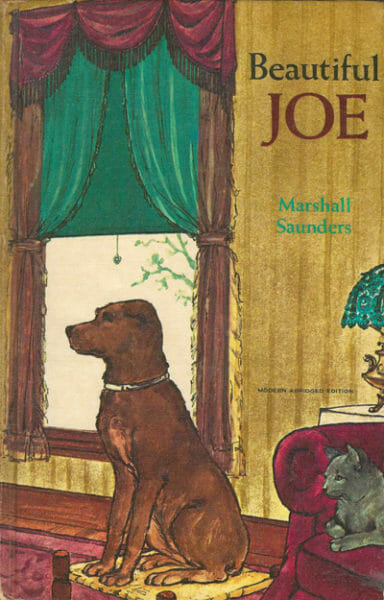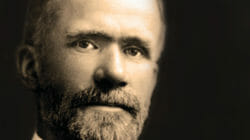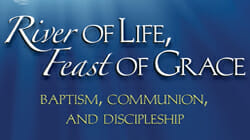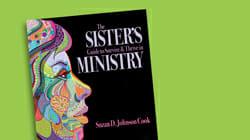‘Beautiful Joe’: teaching compassion for more than a century
 Editor’s Note: Animal lovers have embraced the book “Beautiful Joe” for more than a century. The book was published by the American Baptist Publication Society, a predecessor of Judson Press, the publishing ministry of American Baptist Home Mission Societies (ABHMS). A park that honors the book’s namesake and author recently received an award that may further the cause of animal advocacy and the Biblical imperative to care for all living creatures.
Editor’s Note: Animal lovers have embraced the book “Beautiful Joe” for more than a century. The book was published by the American Baptist Publication Society, a predecessor of Judson Press, the publishing ministry of American Baptist Home Mission Societies (ABHMS). A park that honors the book’s namesake and author recently received an award that may further the cause of animal advocacy and the Biblical imperative to care for all living creatures.
By the Rev. Dr. Cassandra Carkuff Williams
In 1903, the American Baptist Publication Society published a fictionalized “autobiography” of a bull terrier/fox terrier mix named “Joe.” The children’s book “Beautiful Joe”—written by Margaret Saunders under the pen name “Marshall Saunders”—told the true story of Walter Moore rescuing a dog who had been abused and nearly killed by his owner, a miller named William Moore.
The story—originally a winning entry to a competition sponsored by the American Humane Education Society—sold more than 7 million copies in 10 languages worldwide in the three decades following its initial publication. Its success led Saunders to say, “I have had the honour of leading the old Ontario dog around the world on a chain of translations and rejoice in the report that he has become quite a propagandist for humanitarianism.”
With the publication of “Beautiful Joe” as well as “Animal Land” in 1925, American Baptists were continuing a biblically grounded commitment to animal welfare that has a long—and oft-overlooked—history within Christianity. Many Christian thinkers from Clement, Chrysostom and Francis of Assisi to Birgitta of Vadstena, John Wesley, Charles Spurgeon and C.S. Lewis held that other-than-human-animals have intrinsic value and are loved by a Creator who requires human beings to treat them with kindness. While these theologians approached the topic from various perspectives, all grounded their convictions in the witness of scripture, which makes it clear that God cares for all living creatures:
Who provides for the raven its prey, when its young ones cry to God for help, and wander about for lack of food? Do you know when the mountain goats give birth? Do you observe the calving of the does? … Who has let the wild donkey go free? Who has loosed the bonds of the swift donkey, to whom I have given the arid plain for his home and the salt land for his dwelling place? . . . Is the wild ox willing to serve you? Will he spend the night at your manger (Job 38:41-39:1, 5-6, 9 ESV)?
Proverbs declares, “The righteous care for the needs of their animals” (12:10 NIV), yet we often read scripture with a humancentric lens that obscures this divine imperative. How many of us noticed that God established covenant relationships with other creatures (Genesis 9:8-10 and Hosea 2:18)? How often have we read about the Sabbath without seeing its mandate to give animals the same day of rest (Exodus 23:12 and Deuteronomy 5:14)? Have we noticed that cruel practices are explicitly prohibited (Deuteronomy 22:10, 14:21, 22:6, 25:4 and Leviticus 18:23) or that the limited natural yield of the Sabbatical year was to be shared not only among all people, regardless of status, but also with all animals, wild as well as domesticated (Exodus 23:11 and Leviticus 25:6-7)?
The American Baptist Publication Society gave Saunders a voice so that she, in turn, could give voice to the voiceless Joe. The result was a book that, for more than a century, has moved people to embrace animal advocacy. After the novel’s success, Saunders continued writing, publishing more than 20 titles and addressing numerous social issues of her day, including child labor and slum clearance, demonstrating that compassion is not a limited commodity but that compassion enlarges and increases the more abundantly and broadly we practice it. Recent research, in fact, has confirmed what many of us knew intuitively: Human suffering and animal suffering are interconnected (“The Link between Animal Abuse and Human Violence,” Andrew Linzey, ed., Sussex Academic Press, 2009). So, too, is advocacy for humans.
In 1934, 31 years after the publication of “Beautiful Joe,” Saunders was awarded commander of the Order of the British Empire and a medal from the Societe Protectice des Animaux, Paris, France, in recognition of her contribution to securing humane treatment for animals. In 1994, the Beautiful Joe Heritage Society was formed to help preserve, honor and showcase the life of the book’s namesake and the literary and humane achievements of Saunders. The society’s Beautiful Joe Park in Meaford, Ontario, Canada, where Joe is buried, was recently honored with a Tourism Award by Meaford Chamber of Commerce, moving the society a step closer to its goal of becoming an international tourist attraction and further spreading Saunders’ appeal in “Beautiful Joe” for humans to “be kind to dumb animals, not only because you will lose nothing by it, but because you ought to; for they were placed on the earth by the same Kind Hand that made all living creatures.”
The Rev. Cassandra Carkuff Williams, Ed.D., is ABHMS’ director of Discipleship Ministries and an appointed fellow of the Oxford Centre for Animal Ethics. For more about animals and the Bible, download ABHMS’ free “God, Animals and Us” workshop (#C905).






